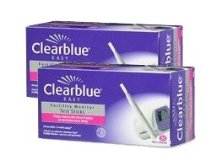
By Colette Bouchez
If you're
over 40 and hoping to get pregnant, new hope has arrived! According to New York City
fertility expert
Dr. John Zhang, a 49 year old patient recently gave birth to a bouncing baby girl –via an IVF
procedure that used her own eggs - and not donor eggs! The birth sets a new record and expands the scientific boundaries of assisted reproductive technology by a considerable margin. Prior to this, the old oldest woman to get pregnant using her own eggs was aged 45.
“For any loving couple, it's one of the greatest gift ….both the doctor and the patient should not give up easily just because of a woman's age,” Zhang recently told
The New York Post, who first reported the story.
Now, if you're thinking this new birth might be an exceptional case, and not likely to be repeated, well, guess again! A second patient at Zhang's New Hope Fertility Clinic - also age 48 – is now pregnant with her own eggs as well. They were retrieved and frozen when she was 47.
How The Pregnancy OccurredTreatment of the 49 year old patient – who right now wishes to remain anonymous – took about two years, with procedures taking place almost every month. Zhang says egg production was not regular, and many of the eggs that were produced were either not viable – meaning they could not be fertilized – or once fertilized were too unhealthy to survive in the womb.
But with doctor and patient refusing to give up, eventually, they stroke “baby gold” ! An embryo that had been fertilized , then frozen, in September of 2008, was placed in the mother's uterus the following March. Nine months later, the fruits of their labors paid off with the birth of a strong, healthy baby girl!
The NY Post reports that following the birth the new mom emailed friends and family with the message : "She's beautiful and healthy....she's definitely the love of our lives!"
Zhang, who specializes in helping older women realize their parenting dreams , says that ironically, the key to his success is not to use
more fertility drugs,
but actually, to use less. In fact, he reports that many of his most successful protocols use little to none of the stimulation drugs commonly used by other fertility centers to help women manufacture multiple eggs. This may be particularly important for older women since there has been some evidence that large doses of egg stimulating medications, along with increased estrogen, may be linked to an increased risk of breast cancer – particularly at a time when a woman's risk are naturally rising due to her age.
Although Zhang is definitely a pioneer in this respect, he is clearly not alone by taking the "natural " approach. Indeed, many doctors are now using various nutrition protocols, including special diets, as well as vitamin and other nutrient combinations to naturally increase not only egg production and ovulation, but also increase the success rate of IVF procedures. There are currently a number of key studies showing the positive impact that the right dietary and nutritional protocol can have.
Additionally, Dr. David Barad and Dr. Norbert Gleicher of the Center for Human Reproduction, located in New York and Chicago, have been using the natural supplement DHEA - short for Dehydroepiandrosterone - to help women over 40 get pregnant faster and easier and have reported increased fertility in this group. DHEA is a precursor compound that the body uses to make steroid hormones, including some that are directly involved in egg production.
To date, however, Dr. Zhang appears to have the only fertility expert with IVF success at age 49.
To read more about the various ways in which diet and nutrition has been clinically shown to increase pregnancy rates, as well as improve IFV outcomes, and learn more about DHEA visit
FertilityDietGuide.com .To learn more about minimal stimulation IVF and other new advances in getting pregnant faster at any age, visit
www.GettingPregnantNow.org .
Copyright by Colette Bouchez 2009 - All Rights Reserved.
In addition to US Copyright, the text of this FERTILITY BLOG is licensed under a Creative Commons Attribution 3.0 License. All Formatting and style elements of this page are not available under this license and Colette Bouchez retains all rights in those elements.
 If you're hoping to conceive a boy, then the infertility treatment known as ICSI (intro cytoplastic sperm injection) may not be for you.
If you're hoping to conceive a boy, then the infertility treatment known as ICSI (intro cytoplastic sperm injection) may not be for you.















